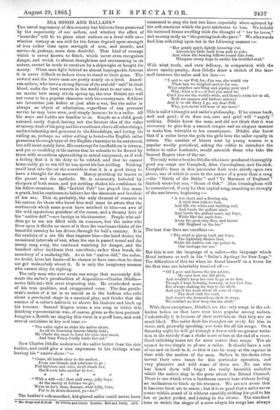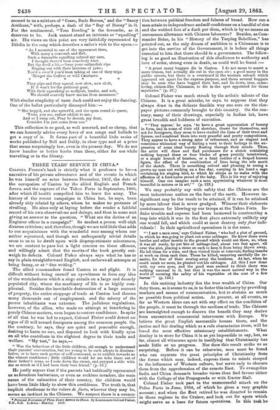SEA SONGS AND BALLADS.*
THE naval supremacy of this country has hitherto been preserved by the superiority of our sailors, and whether the effect of " ironsides" will be to place other nations on a level with us—
whether victory at sea will for the future depend upon strength of iron rather than upon strength of arm, and muscle, and nerve—is, perhaps, more than doubtful. That kind of courage which is never known to flinch, which never even recognizes danger, and which is almost thoughtless and unreasoning in its nature, cannot be made to contract by a shipwright or bought for money. When men fight behind an almost impregnable fortress it is never difficult to induce them to stand to their guns. The coward and the brave man are pretty nearly on a level. Ameri- can sailors, who have a strong flavour of the real old "salt" in their blood, make the best seamen in the world next to our own ; but, no matter how many rivals spring up, the true British tar will not cease to be a popular character with his countrymen. Soldiers are favourites just before or just after a war, but the sailor is always an object of admiration, regardless of any personal service he may have seen, and simply because he is a sailor. All his ways and habits are familiar to us. Simple as a child, good- natured, easily dupad, having not the faintest idea of the value of money, fond of his grog and his sweetheart above all otherthings, undiscriminating and generous in his friendships, and loving his calling as, perhaps, no other calling is loved—the English sailor presents a thorough type of the English character in its untutored, but still most manly form. His contempt for landlubbers is intense, and yet so confiding is his nature that he submits to be fleeced by them with sensations approaching to actual enjoyment, as if with a feeling that it is his duty to be robbed, and that he cannot honourably go to sea till he has spent his last shilling. Nothing could beat into the tar the conviction that it is a good thing to have a thought for the morrow. Money-grubbing he leaves to the purser and the carfindo. He is constantly befooled by sharpers of both sexes, and yet nothing shakes his confidence in his fellow-creatures. His "faithful Poll" has played him many a prank, but he continues to believe her the sincerest and loveliest of her sex. This is, probably, the only element of romance in his nature, for those who know him well must be aware that the sentiments which some poets have ascribed to him—an awe of the wild mysterious grandeur of the ocean, and a dreamy love of his "native dell"—are foreign to his character. People who sel- dom go to sea are filled with its romance, but the sailor who lives upon it thinks no more of it than the coachman thinks of the beautiful country he has driven through for half a century. It is the realities of a sea life that impress him—the hard duties, the occasional intervals of rest, when the can is passed round and the merry song sung, the continual watching for danger, and the hundred other incidents that constitute, rather than break, the monotony of a seafaring life. As to his "native dell," the sailor, no doubt, loves his home—if he chance to have one—but he does not get melancholy about it. It is only the imaginary seaman who cannot sleep for sighing.
The only man who ever wrote sea songs that accurately deli- neate the sailor's peculiarities of disposition—Charles Dibdin- never falls into this error respecting him. He overlooked none of his true qualities, and exaggerated none. The fine gentle- man's notion of a tar is as unreal as is the buffoon who rolls about a provincial stage in a nautical play, and thinks that the essence of a sailor's habits is to shiver his timbers and bitch up his trousers. Samuel Rogers wrote a sea song in which this finicking representation was, of course, given as the true portrait Imagine a British tar singing this verse in a puff bass, and with several variations in key and tune :—
" The sailor sighs as sinks his native shore, As all its lessening turrets bluely fade;
He climbs the mast to feast his eyes once more, And busy Fancy fondly lends her aid."
Now Charles Dibdin understood the sailor better than the rich banker, and could give a true expression to his feelings when leaving his "native shore :"—
" Come, all hands ahoy to the anchor, From our friends and relations to go ; Poll blubbers and cries, devil thank her, She'll soon take another in tow.
"With a will—oh ! then pull away, jolly boys, At the mercy of fortune we go ;
We're in feet, then, damme, what folly, boys, For to be down-hearted, yo—ho !"
The banker's soft-mouthed, kid-gloved sailor could never have
* &a Songs ad Ballads. By Imain and others. London: Ball and Daldy. 1803.
consented to sing the last two lines, especially when agitated by the soft emotions which the poet attributes to him. We behold his tattooed breast swelling with the thought of " her he loves," and musing sadly on "the parting look she gave." We afterwards find him reflecting upon her in the following manner :—
" Her gentle spirit, lightly hovering o'er, Attends his little bark from pole to pole; And, when the beating billows round him roar,
Whispers sweep hope to soothe his troubled soul."
With what truth, and even delicacy, in comparison with the above namby-pamby, does Dibdin draw a sketch of the fare- well between the sailer and his love :—
"I said to our Poll, for, dye see, she would cry
When last we weighed anchor for sea, What argufies sniv'lling and piping your eye Why, what a d—d fool you must be.
Can't you see the world's wide, and there's room for us all, Both for seamen and lubbers ashore ?
And if to old Davy I go, my dear Poll, Why, you never will hear of me more."
This is sailor's thought and sailor's philosophy. If he comes back, well and good ; if he does not, care and grief will " argufy " nothing. Dibdin knew the 'man, and did not think that it was necessary to give him a smooth tongue and an elegant manner
to make him tolerable to his countrymen. Dibdin also knew that if a sailor loves the girls the girls love the sailor equally in return. The number of letters sent by young women to a popular weekly periodical, asking the editor to introduce the writers to sailor husbands, would astonish those who take the Samuel Rogers view of the tar.
The only writers besides Dibdin who have produced thoroughly good sea songs are Campbell, Alan Cunningham, and Garrick. Campbell's fame in this particular field rests chiefly upon two pieces, one of which is more in the nature of a poem than a song —the "Battle of the Baltic" and "Ye Mariners of England." Garrick wrote but one, "Heart of Oak." Alan Cunningham will be remembered, if only for that capital song, smacking so strongly of the sea-breeze, beginning :—
" A wet sheet and a flowing sea, A wind that follows fast,
And fills the white and rustling sail, And bends the gallant mast.
And bends the gallant mast, my boys, While like the eagle free, Away the good ship flies, and leaves
Old England on the lee."
The last four lines are excellent :— "The wind is piping loud, my boys, The lightning flashes free,
While the hollow oak our palace is, Our heritage the sea."
But this is not the language of a sailor,—the language which Hood imitates so well in his "Sailor's Apology for Bow Legs." The difficulties of this tar when he found himself on a horse for the first time are inimitably touched off :—
" Off I goes and leaves the inn astaru ;
My oyes how she did pitch, And wouldn't keep her own to go on no line, Though I kept bowsing, bowsing, at her bow line, But always making lee way to the ditch, And yaw'd her head about all sorts of ways, The devil sink the craft.
And wasn't she tremendous slack in stays, We couldn't no how keep the inn abaft."
With these exceptions, Dibdin's are the only songs in the col- lection before us that have ever been popular among sailors. Undoubtedly it is because of their truthfulness that they are so
much liked. The sailor finds his thoughts set ready for him in verse, and, generally speaking, one tune fits all his songs. On a Saturday night he will go through a dozen with no greater varia- tion in the melody than a shake more or less at the end of a verse. Good rollicking tunes are far more scarce than songs. The air
cannot be too simple to please a sailor. It should have a sort of see-saw or lurch in it, so that it can be sung at the capstan in time with the motion of the men. Sailors in the docks often invent their own tunes for this particular operation, and very plaintive and wild some of them are. No one who has heard them will forget the really beautiful melodies which the sailors sing in the ports about the Bristol Channel. There is one which even a landsman cannot hear without feeling an inclination to hitch up his trousers. We are not aware that it has over been set to music ; but it is so good that a sailor never comes within sound of it without carefully shifting his quid to his hat or jacket pocket, and joining in the chorus. The standard
tune to which the singer of a crew adapts his songs has always
seemed to us a mixture of " Cease, Rude Boreas," and the "Saucy Arethusa," with, perhaps, a dash of the "Bay of Biscay" in it. For the sentimental, "Tom Bowling" is the favourite, as it deserves to be. Jack cannot stand an intricate or "squalling" air. His views on this point are very faithfully represented by Dibdin in the song which describes a sailor's visit to the opera :—
" As I mounted to one of the uppermost tiers,
With many a coxcomb and flirt, Such a damnable squalling saluted my ears,
I thought there'd been somebody hurt.
But the devil a bit,—'twas your outlandish rips Singing out with their lanterns of jaws ; You'd a swor'd you'd been taking .of one of they trips liongst the Caffres or wild Catabaws.
They pipe and they squeal, now alow, now aloft, If it wan't for the petticoat gear, With their squeaking so mollyish, tender, and soft, We should scarcely know ma'am from mounseer."
With similar simplicity of taste Jack could not enjoy the dancing. One of the ballet particularly dismayed him :—
"She hopp'd, and she sprawl' d, and she spun round do queer, 'Twas, you see, rather oddiah to me ;
And so I sung out, Pray be decent, my dear, Consider I'm just come from sea."
This collection is so good, so well assorted, and so cheap, that we can honestly advise every lover of sea songs and ballads to get a copy of it. It forms part of a beautiful little series of works published by Bell and Daily, in clear type and at a price that seems surprisingly low, even in the present day. We do not know handier or better books than these, either for use while travelling or in the library.































 Previous page
Previous page